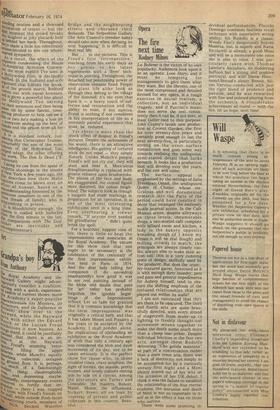Opera
The fire next time
Rodney Milnes
La Bohente is the victim of its own popularity. Audiences look upon it as an operatic Love Story, and it must be tempting for managements to give them what they want. But the libretto, one of the most compressed and detailed devised for any opera, is a tough exercise in social realism, a collective, not an individual tragedy, and if Puccini's music does not serve the text consistently then it can be, if not bent, at least Geller-ised to this purpose. John Copley's lavish new production at Covent Garden, the first for over seventy-five years and certainly good enough to last the next seventy-five, is particularly strong on the overt surface romanticism and goes some way towards realising the ambiguous, semi-stated detail that lurks beneath. It looks like a production that will develop over the years, and the rest will come.
The surface appeal is emphasised by the settings of Julia Trevelyan Oman, the undisputed Queen of Clutter, whose meticulous and well documented research into the Paris of the period could have resulted in decor that swamped the endlessly subtle internal action. In the Cafe Momus scene, despite alleyways on three levels, innumerable shops, a two-storied cafe complete with billiard room and kitchen, a lady in the bakery opposite kneading dough (if I know my Oman it will be real dough) and milling crowds to match, the principals are always clearly visible, always able to make their action tell: this is a very cunning piece of design, skillfully used by the producer. But does the crumbly-textured garret, festooned as it is with enough dirty laundry, pots and pans and general impedimenta for Aubrey himself, tend to obscure the shifting emphasis of the tortured relationships that are played out within its walls?
I am not convinced that they are there to be obscured. The third and fourth acts are quite beau tifully directed, with every strand of stagecraft from make-up to lighting to freshly thought-out movement woven together to make the death scene much more than a cheap tear-jerker. Despite individual felicities in the first two acts, amongst them Rodolfo delivering "Che gelida mannina" as part of a conversation rather than a mere tenor aria, there was a lack of electricity not simply to be accounted for by a curiously uneasy first night and a Mimi plainly scared out of her wits on the occasion of her UK debut. I think it was the failure to establish the relationship of the four eternal students; the intrusion and death of Mimi is not so important in itself as in the effect it has on those who survive.
There were some stunning in
dividual performances. Placido Domingo combines faultless vocal technique with superlative acting ability: his Rudolfo is a classic. Wendy Fine's dangerously buxom Musetta, too, is superb and Katia Ricciarelli is already a good Mimi and will be a memorable one once she is able to relax. I was particularly taken with Thomas Lawlor's Alcindoro, no doddering buffoon but a strong and positive portrayal, and with Derek Hammond-Stroud's sleazy Benoit. Silvio Varviso conducted with just the right blend of prudence and passion, and he was rewarded with fine and pointed playing from the orchestra. A considerable achievement all round — with the fire, let us hope, next time.


































 Previous page
Previous page